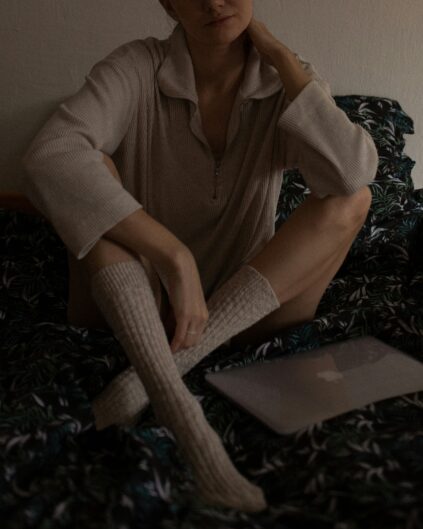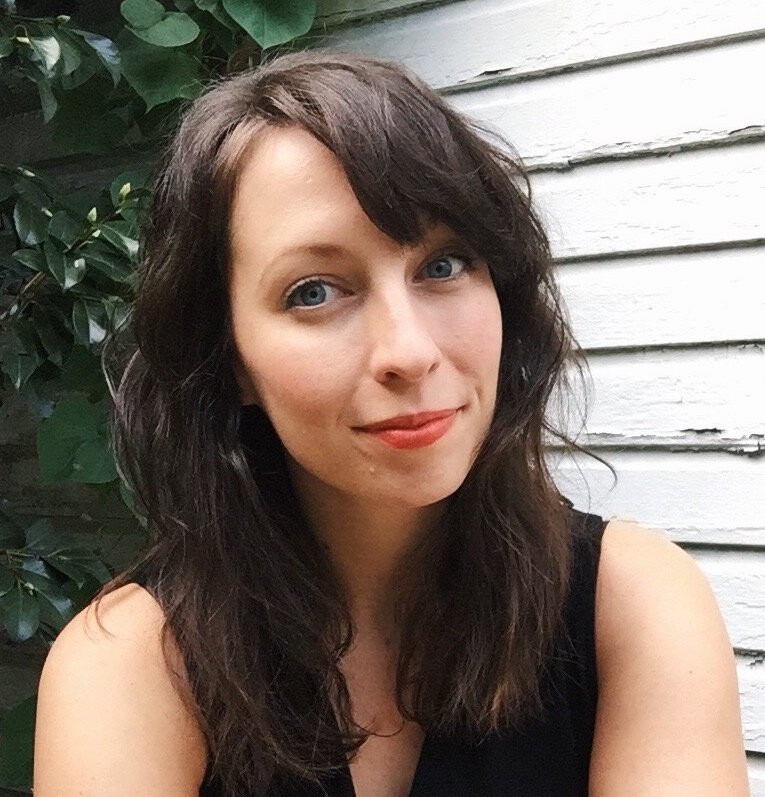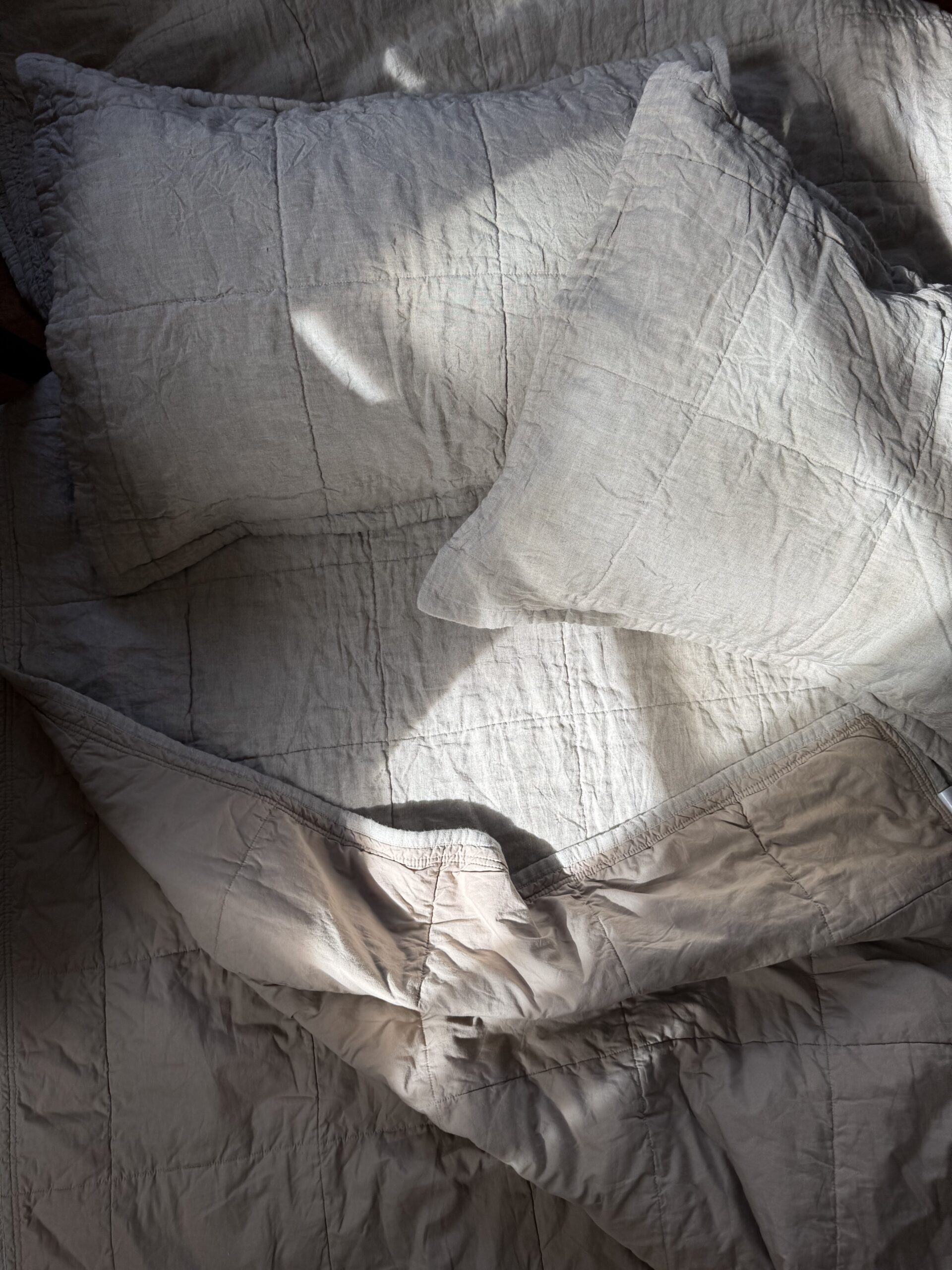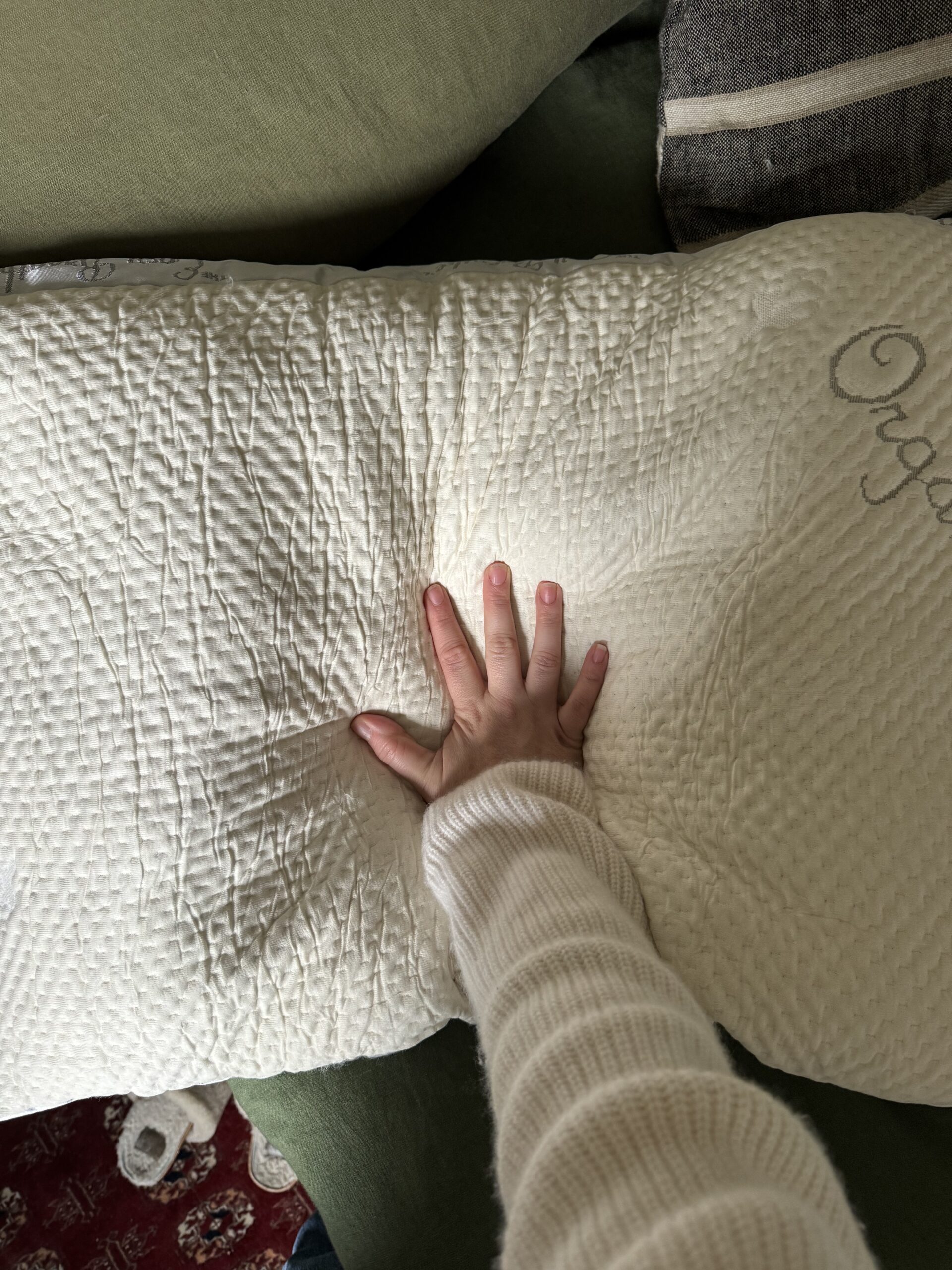
Why I’m Embracing Messiness
Last month, my best friend of nearly 30 years came to visit. We met at summer camp, and we’ve lived in different time zones our whole lives, rarely seeing each other more than once a year. This was the first time Mallory would meet my child and see our home IRL. She was going to stay for one week; I’d been looking forward to it for months. And I spent the first 48 hours of our time together having an absolute meltdown about how messy my house was.
“I spent the first 48 hours of our time together having an absolute meltdown about how messy my house was.”
I’d had every intention of not just cleaning the house top to bottom, but also transforming it into the airy, whimsical bungalow of my Pinterest dreams. But somehow, there was always something in the way: Work or family obligations, dozens of meetings and appointments, errands that brought in yet more stuff that needed to be sorted and put away. I managed to clean the bathrooms and wash some sheets for the guest bed, but somehow, the days kept slipping by and my list only seemed to be growing longer.
And then, mid-morning on the day of her arrival, we discovered fleas on one of our dogs. My plan to speed through last-minute Hail Marys to create the perfect home were instantly overwritten with hours of flea baths, laundry, and treating every inch of the house. When Mallory arrived, it wasn’t to the spotless front porch and a warm hug from her clean, fresh-faced best friend, but to a sweating, grouchy woman still trying to dry off a couple of damp dogs, and the strong scent of cloves from the flea treatment wafting in the air conditioning in waves.
“As my daughter took Auntie Mallory around on the tour, I felt myself growing hot with shame. Do we really live like this? I kept thinking, certain that’s what she was thinking too.”
“Well, at least everything is clean,” my husband told me before she walked in. But all I could see were the chips of paint on our scuffed baseboards, the cheap lamps that weren’t quite the right size on the end tables, and the plastic we’d had wrapped around our broken fireplace to keep out the rain. As my daughter took Auntie Mallory around on the tour, I felt myself growing hot with shame. Do we really live like this? I kept thinking, certain that’s what she was thinking too.
Look, we do the best we can: We have three pets, a young child, full-time jobs. We had been learning how to navigate a medical diagnosis for the past year, rearranging all of the cabinets and closets to house supplies. My husband and I are both creatives, with projects that take away from domestic priorities sometimes — or, in the case of Aaron’s woodworking, create a lot of short-term mess in pursuit of a long-term solution like a custom-made cabinet or toy chest.
And yet, following my daughter as she led my best friend around our house for the first time, none of these reasons felt good enough. The pack of toilet paper sitting outside the bathroom, the unpainted patches on the walls, and the stray tumbleweeds of dog hair loomed accusingly from every corner, all evidence of my laziness and ineptitude. Because despite my ability to intellectually grasp that the tidiness of one’s home holds zero moral value, the correlation between how my house is perceived and my own personal worth was somehow still inextricably linked. I called my mom, telling her how ashamed I felt.
“Despite my ability to intellectually grasp that the tidiness of one’s home holds zero moral value, the correlation between how my house is perceived and my own personal worth was somehow still inextricably linked.”
“Mallory does not care,” she told me. “She loves you; she’s not here to judge your house. She’s here to see you!”
I knew this. I knew that she couldn’t be judging me any more than I would be judging her by the sticky kids’ fingerprints on the dining room table or the watermarks on the wine glasses. Who cares! And yet.
“You’re wasting your time together,” my mom said when I called again the next day. I was aware of this, that I was squandering this rare visit on lamenting a failure I didn’t even believe in. I regularly choose to prioritize something else over folding the endless mountain of laundry, and I stand by these decisions. So why is it that I was walking around worried that the woman I’ve known for almost 30 years was going to suddenly decide I was a disaster just because there was some dust in my house? It’s not like it was going to be a surprise to her.
And maybe that was the problem. I wanted to surprise her. I wanted her to see something in me that had changed for the better, had grown up and into myself, blossoming, finally, into the woman my messiness had been suppressing. What else could it mean that I was just as untidy as I’d been three decades ago, when we were children?
What’s underneath the mess
On any given day, a walk through my home will treat the visitor to all the sights and sounds of a family constantly in the middle of something: There are always dog leashes and towels dropped in the entryway, a stack of mail that needs sorting on the table next to it. Toys for the pets and our daughter intermingle on surfaces while the robot vacuum takes a Sysiphian lap around the room. Bits of popcorn and colored pencil shavings peek out from the sofa cushions, and a subscription box of toiletries I don’t yet need has been parked on the ottoman for almost a week. In almost every room: Multiple empty glasses, cans of partially drunk seltzer, baskets of (usually clean) laundry waiting to be folded. Books with their pages marked by pens or a pair of sunglasses. Charging cables hanging from every outlet.
“It’s not that I don’t want a clean and tidy space … There’s just always something more urgent or more important to do.”
It’s not that I don’t want a clean and tidy space — I do! Of course I do! There’s just always something more urgent or more important to do.
All my life, I’ve been labeled with certain words: “Creative,” “artsy,” “free-spirited.” These often came in pairs though, their partners not quite so desirable: “Untidy,” “chaotic,” and of course, “messy.” Though usually said with fondness, there was also chagrin. I couldn’t help getting a little defensive about it. I was an artist and a writer, after all; it didn’t seem fair to comment on the state of my desk, office, or living spaces when I was in the middle of a project or on a deadline, when all of my energy and focus was going to the completion of the work! I could barely eat proper meals or take regular showers when I was in the 48-hour sprint to a creative finish line, so the half-unpacked grocery bags on the counter were just going to have to wait (it’s not like there was anything refrigerated in there, what’s the big deal?). But those gentle chuckles and headshakes still got to me.
“If I hadn’t been ‘procrastinating,’ I would have probably been able to keep up with my work and the daily detritus of my life before it got so out of hand.”
They say that we have the strongest reactions to things that are true. Unfortunately, because I almost always waited until the last minute to throw myself into these projects, the implication was that my messiness could be avoided. If I hadn’t been “procrastinating,” I would have probably been able to keep up with my work and the daily detritus of my life before it got so out of hand. This was a sentiment expressed by roommates, boyfriends, friends, and bosses, echoing the teachers and family members of my childhood who were mystified at my inability to simply manage my time and my belongings in a more orderly, consistent manner. I learned that, regardless of how the work turned out, any success was just a little bit tainted by the idea that if I could just be more organized and less messy, then I could really reach my full potential. Anything good I made seemed to come with subtitles: “This could be so much better.”
A part of me worried it was true, that my work was a slapdash, lesser version of what it could be if I’d only get it together and try a little harder. And this little kernel of self-doubt fueled an inner critic that has plagued me for decades.
My invisible priorities
In an early get-to-know-you questionnaire for my incoming grad school class, we were asked to describe our writing process style on a spectrum from “A methodical, daily practice” to “Sprint writing.”
“Do you have a daily word count or amount of time you try to achieve each day? Or do you go days without writing and then stay up for two nights in a row to write half a manuscript?” the questionnaire asked. I couldn’t believe it. That’s me, I thought. And as it turns out, about half of my cohort as well. It was the first time that my behavior was presented to me as something other than a problem. It was, in graduate school, my process.
“It was the first time that my behavior was presented to me as something other than a problem. It was, in graduate school, my process.”
This was also my introduction to the idea that our abilities are not fixed values, but subjective frameworks determined by the conditions of our environment.
Later, I took a class with a visiting artist who spent an entire semester bringing the point home, reminding us constantly to trust whatever way we found ourselves getting the work done. If anyone lamented their time spent not writing, characterizing it as lazy or wasted, she was quick to defend it. “You aren’t doing nothing,” she said, adamant. “You haven’t turned your brain off to the world. You’re gathering, making connections. You’re living, picking up the material you’ll reach for when you are actually making the work.” She used to laugh at those of us who were harder to convince, so certain of our own inadequacies. “Where do you think it all comes from?” she asked. “The fallow periods!”
In farming, when crops are left plowed but unsown to restore their fertility, they are said to “lie fallow.” It’s a time when nothing seems to be happening, but it is in fact a crucial practice in crop rotation. And also, apparently, artmaking.
And she was right. That time spent leading up to a deadline wasn’t empty; I wasn’t just avoiding my work, because often, I was thinking about it pretty constantly. I was gathering images and making connections from the things I was experiencing. What I’d been calling “putting off” was a kind of research, a preparation of wherever it is in my brain where the words grow.
“What I’d been calling ‘putting off’ was a kind of research, a preparation of wherever it is in my brain where the words grow.”
I instantly understood the value of this even as it became crystal clear why it was impossible to quantify: The work was invisible to everyone but myself.
I couldn’t say that I wrote 700 words every day, or spent each morning from 4–7 a.m. at my computer. Answering the question “Did you write today?” with “No, I went on a long walk with a friend and read a book,” was still a “no.” It didn’t matter if the conversation on the walk and the subject of the book produced some crucial piece of info or idea that would fuel a 24-hour writing marathon and become a key part of my thesis. The bottom line was still that no, I hadn’t written that day. Which somehow seemed flaky, despite the results.
I’d tried to keep a daily practice, but producing even 200 words a day didn’t guarantee anything about their quality — I often threw them out, feeling defeated. Even sitting in front of my computer at designated times likewise did not mean I’d spent that time writing, leaving me feeling both discouraged and guilty. When I asked about this, wondering why it was so hard for me to work the “right” way, the visiting artist simply said, “Trust your process.” It would take me almost ten years to learn how.
Trusting the process
I was diagnosed with ADHD as an adult, well after all of my habits and ways of thinking about work were deeply ingrained. So though it helped me to understand why I would launch these fullscale side quests on a deadline for something completely unrelated (remember how I decided to tackle every problem in my entire house before Mal’s visit?), it didn’t instantly undo some of my core beliefs around productivity, tidiness, and their link to being a reliable, competent person.
If perception is reality, then letting someone perceive me as “messy” meant that it (and all of the many connotations it conjured) were basically true. I might understand that a desk of notes and papers and empty coffee cups holding open books was a sign of work clearly in progress, but if others only see it as sloppiness, then there was very little I could do or say to convince them otherwise.
“If perception is reality, then letting someone perceive me as ‘messy’ meant that it (and all of the many connotations it conjured) were basically true.”
In other words, as long as I was “messy,” I would forever believe, on some level, that I was not a fully realized person. That I wasn’t good enough. That I was, ultimately, a failure. That is, as long as I let myself behave as if something I don’t actually believe is true.
What if, instead of seeing the messes in my life through the imagined lens of a judgmental outsider, I saw it through the lens of someone who cherished this life?
“What if, instead of seeing the messes in my life through the imagined lens of a judgmental outsider, I saw it through the lens of someone who cherished this life?”
The streaks of egg yolk left on breakfast plates gleaming in the sunlight, a glob of jam that’s shiny as a gemstone. The little notes to himself my husband makes on the backs of receipts in his beautiful handwriting. A handful of Lego pieces, a gold pipe cleaner, and a paper airplane taking a ride on the robot vacuum. A Peppa Pig character dining over a deck of cards with the mom from Bluey, little acorn tops used as hats. Puffs of fur and splashes of water around a silver bowl, where our two dogs and cat vie for the first laps of a fresh refill. A bag of bottles and cans from our impromptu pizza night sitting by the back door, waiting to be carried to the recycling bin.
These are not just messes, but signs of life — my precious life, shared with the people and animals I love most. The little things they leave around the house are clutter, yes, and if I want our surfaces to be clear and everything to remain spotless, then it often falls on my plate to do it. But I regularly choose not to. Not because I’m lazy, and not because I’m careless, negligent, incompetent, or slovenly. It’s because I am prioritizing other things.
“These are not just messes, but signs of life — my precious life, shared with the people and animals I love most.”
The week before my first overnight trip away from my daughter, our babysitter got a stomach flu, leaving me without childcare every afternoon. I had two big deadlines that I tried to work on before picking her up, so I had to streamline my attention to weekly chores. So while I still washed all our clothes that week, I didn’t fold them. Instead, I sorted them into piles and dropped each person’s basket in their rooms.
Could I have found the time to fold these clothes and put them all away? Maybe. We have about two hours each night after our daughter goes to bed when we could have folded laundry, I guess, but my husband and I were exhausted from long days, in need of rest and recovery time, hoping to spend it together. So we didn’t do chores — we watched good TV, we made dessert, we talked. We took the dogs out and looked up at the moon.
“We didn’t do chores — we watched good TV, we made dessert, we talked. We took the dogs out and looked up at the moon.”
Instead of folding the laundry when I had my daughter in the afternoons, we went to the library and the playground, made banana ice cream, and painted a piece of furniture. She peeled carrots and helped me chopped vegetables, and we talked about my upcoming trip — about what to expect, and how she was feeling. We spent the week dressing from our piles, and I made my deadlines. When it was time for me to leave, my daughter was teary but calm. She didn’t melt down, because we’d spent the week preparing for this. And she still had clean clothes to wear, even if she was pulling them from a laundry basket instead of her closet.
From the outside, it might be easy to see the clothing piles and assume all kinds of things — that we are messy and disorganized, that we don’t care for our belongings. But what I’m learning is that I don’t have to think that, when I know what those piles of clothes actually mean: That I am a responsible employee, a proactive and attentive parent, and a devoted partner.
And I put loving my family and our life together before any housekeeping. It might make me messy, and that’s a price I’m willing to pay.
This one precious, messy life
The camp where Mallory and I met the summer of 1997 was Camp Mystic, where the recent flash floods wiped out century-old buildings and claimed dozens of lives. We met in a cabin on the flats, the very spot where so much of the catastrophe took place. Our bunks were next to each other, the narrow strip of wall between us split so we could each tack up photos from home. The green painted dresser between us was crowded with matching box fans, a cluster of shimmery nail polish, and our silver charm bracelets tangled together.
“The green painted dresser between us was crowded with matching box fans, a cluster of shimmery nail polish, and our silver charm bracelets tangled together.”
I look at the images of the ravaged cabins, all the trunks and quilts and stuffed animals in filthy piles on the concrete floors, the black smudges from the water line reaching almost to the ceiling, and remember holding hands with Mallory across the aisle as we listened to Taps play over the loudspeaker at lights out. I remember the way she neatly folded her red shorts before tucking them into her drawers while I just tossed my blue ones into the pile of my perpetually open trunk. She was always more organized than I was, had a better understanding of how things worked and what order to approach a task to accomplish it in good timing. But this doesn’t have to be an indictment of my own abilities; it can be admiration and appreciation of hers.
When she noticed I still hadn’t opened the robot vacuum I’d gotten for Christmas while she was visiting in June, she didn’t seem to comprehend my mental block. “I just can’t bring myself to figure it out and program it,” I told her. She looked at me, not judgmentally, but quizzically. “Oh?” She walked over to the box, picked it up. “I think you just turn it on.” She asked for my phone, downloaded the app, and within minutes the robot was zooming around the house, sucking up all those tumbleweeds of dog hair that were so often a source of shame.
“This doesn’t have to be an indictment of my own abilities; it can be admiration and appreciation of hers.”
A voice in my head tried to remark on how easy it was, how I’d been wasting all this time living in dog-hair hell just because I was too lazy to figure out how to fix it. But I decided not to listen to that voice this time. I decided to just be grateful for someone like Mallory, more sister than friend, who has been a witness to so much of my life even from afar, even when we go years without being in each other’s presence. How she can so swiftly zero in on the thing I need, then simply step in and do it.
We’ve been on the phone nearly nonstop as we’ve watched the Camp Mystic tragedy unfold, feeling it all together, sharing the grief with thousands of others whose lives were changed by their time on the Guadalupe River, too. We’ve cried and shared news from the vast network of women alums in hundreds of text chains, the conversations punctuated with memories and disbelief. The tragedy has reconnected so many of us, and we catch up, learning about the people we’ve become. The conversations are messy and raw and awkward and also instantly intimate, our shared roots to this place in the Texas hill country forging a sisterhood that’s much stronger than whatever differences lie between us.
“It might be harder to measure than anything in the physical world, but it’s infinitely more valuable: The ties that bind us, the ways we make each other feel.”
It’s the time we have together that we remember, the only thing that matters in the end. It might be harder to measure than anything in the physical world, but it’s infinitely more valuable: The ties that bind us, the ways we make each other feel. When my cabinmates recall the sticky puddles on the commissary floor, we don’t remember how disgusting we used to be, but how we found the last half gallon of Blue Bell ice cream left in the freezer. How, shrieking with anticipation, we crowded into a cluster to eat it directly from the tub as it melted, passing a single spoon between us.
My daughter marching her Auntie Mallory through the house minutes after meeting her isn’t a parade of all the repairs and chores I’ve let lapse because I’m lazy, but a chance to admire the work I’ve been doing instead: Raising a confident, joyful child who trusts me so much she loved a relative stranger sight unseen, just because she knows that I do.
There’s nothing clean or straightforward or tidy about that, the ineffable ways that love is passed and grown. But what a gift that is. What an impossibly beautiful, messy, perfect gift.
Stephanie H. Fallon is a Contributing Editor at The Good Trade. She is a writer originally from Houston, Texas and holds an MFA from the Jackson Center of Creative Writing at Hollins University. She lives with her family in the Blue Ridge Mountains of Virginia, where she writes about motherhood, artmaking, and work culture. Since 2022, she has been reviewing sustainable home and lifestyle brands, fact-checking sustainability claims, and bringing her sharp editorial skills to every product review. Say hi on Instagram or on her website.




